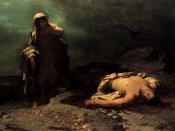In Antigone, by Sophocles, the theme is, "pride brings destruction to mortal man." This theme is expressed through the setting and the actions of the characters.
Antigone was too proud to let her brother be eaten by the vultures and maggots to be seen by everyone. She knew that the penalty for trying to bury Polynices, her brother, was death. She went ahead and buried him anyway. When caught by soldiers, she did not deny trying to bury him. When she confronted Creon, she defied him. Therefore, she was put to death because of her pride.
Now Creon, he too was prideful. He wanted every single person to know that he was king and that he made the rules. If anyone disobeyed him, the penalty was death.
Creon placed himself above the gods, which was a mistake. Even though the people may not have noticed that he put himself above the gods, he would have been overthrown if they had noticed.
Creon ordered that no one buried Ploynices. Antigone was put to death because of Creon's pride. Haemon, Creon's son and Antigone's fiancé, killed himself and Creon's wife, Eurydice, killed herself. The chain reaction from Antigone's death caused a chain reaction, ruining Creon's life, bringing destruction to his life.
Summing it all up, pride brought destruction to two people. One destruction was physical, which was death. The other, emotional, which was losing his loved ones.


